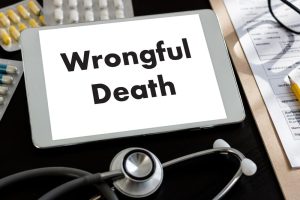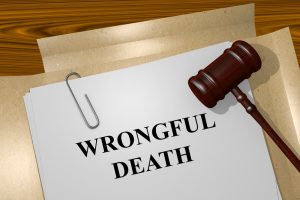Losing a loved one is one of life’s most devastating experiences, and when their death results from someone else’s wrongful actions, it’s even harder to find peace.
As someone left behind, you deserve answers and justice. While nothing can erase your loss, filing a wrongful death claim can provide some measure of closure and financial security.
A wrongful death lawyer can guide you through holding those responsible accountable.
Establishing the Legal Definition of Wrongful Death
Wrongful death occurs when a fatality occurs due to the intentional, negligent, or reckless behavior of another party. Courts often view these cases as civil matters, separate from any criminal charges arising from the same event.
For example, if someone’s careless driving caused a fatal car accident, a wrongful death claim will focus on compensating the surviving family rather than punishing the driver.
Each state has its own laws governing wrongful death claims, but they share some common principles. A wrongful death attorney can ensure that your claim meets the legal requirements specific to your jurisdiction.
Regardless of where you file, proving wrongful death generally involves satisfying several elements.
Proving Duty of Care
The first step in proving a wrongful death claim is demonstrating that the defendant owed a duty of care to the deceased. A duty of care refers to an individual’s obligation to act reasonably to avoid harming others.
For example, drivers owe a duty of care to others on the road, meaning they must follow traffic laws and drive safely to prevent accidents.
In a medical malpractice suit, for example, healthcare providers owe their patients a duty of care by adhering to established treatment standards.
If your loved one died in a slip and fall in a grocery store, you can take action against the property owner. Owners must maintain their premises in a reasonably safe condition to protect visitors. Identifying the specific duty of care owed to your loved one is foundational to building your case.
Showing a Breach of Duty
Once your attorney establishes a duty of care, they must next show the defendant failed to uphold that obligation.
A breach of duty occurs when someone’s actions or inactions fall short of what a reasonable person would do in the same circumstances. For example, a driver who texts while driving breaches their duty of care to others by creating an unnecessary risk of harm.
Proving a breach often requires gathering evidence to illustrate how the defendant’s behavior deviated from acceptable standards. Eyewitness statements, surveillance footage, or medical records can provide valuable insight into what happened and how the defendant’s conduct led to the tragedy.
Demonstrating Causation
Causation is one of the most critical elements in a wrongful death claim. You must prove that the defendant’s breach of duty directly caused your loved one’s death.
This step involves connecting the dots between their actions and the fatal outcome. It’s not enough to show that the defendant acted negligently; their behavior must be the proximate cause of your loss.
For instance, if a distracted driver rear-ended your loved one’s vehicle, causing a fatal injury, your attorney will need to demonstrate how the collision led directly to their death.
Medical testimony, accident reconstruction reports, and other forms of evidence can help establish this link. Without clear causation, it becomes difficult to hold the defendant accountable.
Quantifying Damages
The final element involves proving that the death resulted in quantifiable damages to the surviving family members.
Damages in a wrongful death claim can include both economic and non-economic losses.
- Economic damages often involve tangible financial losses, such as medical bills, funeral expenses, and lost income.
- Non-economic damages account for the emotional toll, including loss of companionship and emotional suffering.
Calculating these damages requires a wrongful death lawyer, especially when estimating future losses like the deceased’s potential earnings or the long-term impact of their absence on the family.
An experienced wrongful death attorney can gather the necessary documentation and expert testimony to present a compelling case for compensation.
Uncovering Evidence to Prove Your Case
Evidence plays a central role in any wrongful death claim. Without it, the defendant may dispute their liability or the extent of your damages. Collecting and preserving evidence strengthens your argument and increases the likelihood of a favorable outcome.
Accident reports, medical records, photographs, and witness statements are often key pieces of evidence in these cases. In more complex claims, expert testimony may also be necessary to explain technical aspects of the case. Your wrongful death lawyer can properly collect and present all relevant evidence.
Understanding the Statute of Limitations
Every wrongful death claim is subject to a statute of limitations, which sets a deadline for filing your case. You may lose your right to seek compensation entirely if you miss this deadline. The specific time frame varies by state, so act promptly.
While it may feel daunting to focus on legal matters while grieving, acting quickly ensures your case remains viable. Evidence can degrade or disappear over time, and witnesses’ memories may fade, or they may decide they don’t want to participate, so filing as soon as possible strengthens your position.
Addressing Defenses in Wrongful Death Cases
Defendants in wrongful death cases often rely on specific defenses to reduce or eliminate their liability. These arguments typically aim to shift blame or introduce doubt about causation.
One common defense is contributory negligence, where the defendant claims that the deceased’s actions contributed significantly to their death. Another frequent argument is that an unrelated event or pre-existing medical condition primarily caused the fatality rather than the defendant’s actions.
Defeating Defense Strategies
Anticipating and countering these defenses is vital to building a strong wrongful death case. Ignoring or underestimating the defendant’s claims can weaken your position and jeopardize your ability to secure compensation.
A wrongful death attorney plays a key role in identifying potential defenses early. For instance, they might examine whether the defendant will argue that the deceased acted recklessly or failed to take necessary precautions. By understanding these tactics, your lawyer can develop an effective strategy to challenge them.
Refuting Arguments with Evidence
Evidence is a powerful tool to refute defenses in wrongful death cases. If the defendant claims that a pre-existing medical condition caused your loved one’s death, medical records can play a critical role in disproving this argument.
A skilled attorney may present documentation showing how the defendant’s actions directly worsened the deceased’s health or accelerated their passing.
A Skilled Attorney is Ready to Overcome All Obstacles
Dealing with the complexities of wrongful death defenses requires legal experience and meticulous preparation. A wrongful death attorney overlooks no details, gathering evidence to challenge the defendant’s claims and protect your rights. By addressing defenses directly and strategically, your lawyer can strengthen your case and pursue the justice your loved one deserves.
The Importance of Witness Testimony
Witness testimony can provide critical support for your wrongful death claim. Whether it’s an eyewitness who saw the incident or a medical professional who treated your loved one, credible testimony adds weight to your arguments. Witnesses can describe what they observed, explain how the defendant’s actions caused harm, and clarify the impact of the loss on your family.
Again, securing reliable witnesses early is essential, as their availability and recollection may diminish. A wrongful death lawyer can identify, interview, and prepare witnesses to testify on your behalf.
Addressing Emotional Loss in Wrongful Death Claims
Beyond financial damages, wrongful death claims often focus on the profound emotional impact of losing a loved one. Courts recognize that no amount of money can replace the deceased’s companionship, guidance, and support.
However, compensation for emotional losses acknowledges the depth of your suffering and helps alleviate some of the burdens associated with your loss.
When pursuing damages for emotional loss, it’s important to provide evidence that illustrates the deceased’s role in your life. Letters, photographs, and testimonies from friends and family can paint a vivid picture of your unique bond and the extent of your loss.
The Challenges of Defeating Insurance Companies in Wrongful Death Cases
Insurance companies are often central to wrongful death claims, especially in cases arising from car accidents, workplace incidents, or medical malpractice. Their primary goal is to minimize payouts, which can make obtaining fair compensation challenging.
These companies often present initial settlement offers designed to resolve claims quickly and at the lowest possible cost. While this might seem like a convenient solution during a difficult time, such offers are frequently insufficient to address the long-term financial and emotional impacts of losing a loved one.
The Risk of Accepting Inadequate Settlements
Accepting an inadequate settlement can have serious consequences. These settlements may not cover medical bills, funeral expenses, lost income, or the emotional toll of your loss.
Without proper legal guidance, you may inadvertently waive your right to pursue additional compensation, leaving you financially vulnerable. Insurance companies know this and often use high-pressure tactics to encourage claimants to settle quickly.
The Importance of Negotiation
A skilled wrongful death lawyer can handle these challenges. Attorneys understand the tactics insurers use and can counteract them effectively. By evaluating the full scope of your loss – including future financial needs, emotional distress, and other damages – your attorney can negotiate for a fair settlement that truly reflects the value of your claim.
This negotiation process often involves presenting compelling evidence, such as medical records, expert testimony, and financial projections, to demonstrate the true extent of your loss. An attorney can also handle all communications with the insurance company, protecting you from tactics designed to exploit your grief and lack of legal experience.
Taking the Case to Court
If negotiations with the insurance company fail to result in a fair settlement, a wrongful death attorney can take your case to court. Litigation allows you to present your lawyer to present your case before a judge or jury, who can determine appropriate compensation based on the evidence.
The prospect of litigation often motivates insurers to increase their settlement offers, as they may wish to avoid the costs and risks associated with a trial.
However, if you must go to court, your attorney will advocate for your rights and present your case persuasively. They’ll work to convince the court that you deserve every bit of compensation you seek.
Why Legal Representation Matters
A wrongful death claim involves complex legal standards, detailed evidence, and, often, resistance from the opposing party. Attempting to handle such a case alone can be overwhelming and may jeopardize your chances of success.
A wrongful death attorney provides the guidance and support you need to navigate the process and pursue justice for your loved one.
They understand the nuances of the law and can craft a compelling case tailored to your unique circumstances. Whether through settlement negotiations or courtroom advocacy, they fight to secure the compensation you deserve, allowing you to focus on rebuilding your life.
Honoring Your Loved One’s Legacy
Pursuing a wrongful death claim is about more than financial recovery. It’s a way to honor your loved one’s legacy. Holding the responsible party accountable sends a powerful message about the value of human life and the importance of justice.
Your loved one’s memory deserves respect. Seeking accountability is one way to achieve that. While no outcome can fully heal your pain, knowing that you’ve done everything possible to seek justice can provide a measure of solace during a difficult time.
Speak to a Wrongful Death Attorney as Soon as Possible
A personal injury lawyer can provide the legal representation and advocacy needed to pursue justice for your loved one. Holding the responsible party accountable ensures that their actions have consequences and that your family receives the support needed to move forward.
While the process may be challenging, seeking justice for your loved one is a powerful way to honor their life and protect their legacy. Let Frankl Kominsky Injury Lawyers provide you with a free case evaluation to clarify your legal options.
 South Florida Injury Attorneys Blog
South Florida Injury Attorneys Blog





